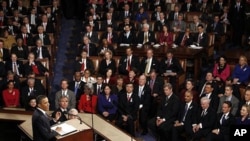President Barack Obama's State of the Union address Tuesday night dealt largely with the nation's domestic economy, but he did touch on some international topics.
President Obama indicated in his State of the Union speech that his administration plans to promote democracy around the world over the next two years.
"No one rival superpower is aligned against us," said Obama. "And so we must defeat determined enemies, wherever they are, and build coalitions that cut across lines of region and race and religion. And America's moral example must always shine for all who yearn for freedom and justice and dignity. And because we've begun this work, tonight we can say that American leadership has been renewed and America's standing has been restored."
Mr. Obama specifically expressed support for the people of Tunisia, who are fighting for democracy after forcing an autocratic leader from power. He mentioned the recent referendum on statehood in south Sudan.
"In south Sudan, with our assistance, the people were finally able to vote for independence after years of war," he said.
Robert Kagan at the Brookings Institution expects more U.S. focus on democracy in the next two years.
"Although people thought that [President] Obama is going to abandon the whole democracy agenda because Mr. Bush had poisoned it, I think you are going to see an increasing return to that issue," noted Kagan.
Kagan also expects the U.S. relationship with China to be a major issue. He says it is not in America’s interest to see a rising China become the dominant hegemonic power in East Asia, with America’s allies in the region falling within the Chinese sphere of influence.
But the China expert at Brookings, Kenneth Lieberthal, says President Obama’s biggest foreign policy challenge in 2011 could be the ongoing transfer of power in North Korea.
"If there is a breakdown as of now we have not really worked carefully with the Chinese," said Lieberthal. "Neither have the South Koreans or the Japanese, as to what the response would be. What would the PLA [the Chinese Army] do on the North Korea side of their border? What would the ROK [South Korean] forces do? What will the U.S. forces in the region do? And the potential for inadvertently everyone getting into a very dangerous situation is pretty high."
The Brookings Institution experts say President Obama still faces a very serious challenges in Afghanistan and Pakistan.
In Afghanistan, says analyst Stephen Cohen, it is becoming clearer every day that the situation cannot be resolved without including the Taliban.
"The irony is that if Taliban are included in the Afghan settlement, then the Indians are upset, the Iranians are upset," said Cohen. "They might turn to military force or supporting group to make sure that that settlement is not achieved."
And in Pakistan, Cohen says, there are three critical issues that affect vital U.S. interests, besides the issue of terrorism:
"There is a short-term crisis in terms of their involvement in Afghanistan, a medium-term crisis in terms of their coherence as a state and a long-term crisis in terms of what they are going to do with their nuclear weapons," added Cohen.
The Brookings experts say that besides his efforts to bring peace to the Middle East and to convince Iran and North Korea to abandon their nuclear programs, President Obama will also have to protect the fragile victory in Iraq.




